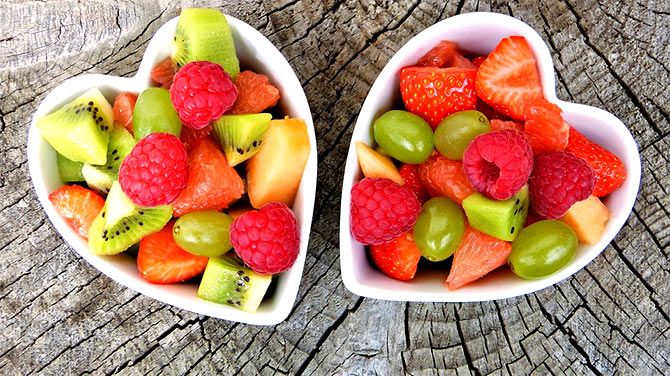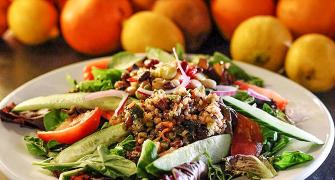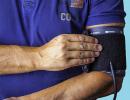These foods will help you fight hypertension and lower blood pressure, says Dr Udgeath Dhir.

Hypertension is one of the leading cause of mortality and morbidity around the world and is an important risk factor for chronic disease burden in our country.
While 90 to 95% of patients having high blood pressures have no clear etiology and are classified as having primary or essential hypertension, 5 to 10 % of people may have an underlying pathology or a reversible cause behind their high blood pressure (Secondary hypertension).
Essential hypertension is usually linked to genetics, poor diet, a lack of exercise and obesity.
Eating a diet that is rich in whole grains, fruits, vegetables and low-fat dairy products and skimps on saturated fat and cholesterol can lower your blood pressure by up to 11 mm Hg if you have high blood pressure.
This eating plan is known as the Dietary Approaches to Stop Hypertension (DASH) diet.
Many researchers have found that certain foods can lower high blood pressure.
Here are some foods you should include in your diet that will help you fight hypertension and lower blood pressure.
1. Berries
Blueberries and strawberries contain anthocyanins, which can help reduce a person's blood pressure.
2. Bananas
Bananas contain plenty of potassium, a mineral that plays a vital role in managing hypertension.
Other potassium-rich food include avocado, cantaloupe and honeydew melon, halibut, mushrooms, sweet potatoes, tomatoes, tuna and beans.
3. Beets
The researchers have suggested that beet's high levels of inorganic nitrate causes the reduction in blood pressure.
4. Dark chocolate
Cocoa-rich chocolate reduces blood pressure in people with hypertension or prehypertension. 1 ounce of chocolate that contains a minimum of 70 percent cocoa recommended for a day.
5. Kiwis
A daily serving of kiwi can reduce blood pressure in people with mildly elevated levels, a survey has revealed.
Kiwis are also rich in vitamin C, which may significantly improve blood pressure readings in people who consumed around 500 mg of the vitamin every day for about 8 weeks.
6. Watermelon
Watermelon contains an amino acid called citrulline, which may help to manage high blood pressure.
7. Oats
Oats contain a type of fiber called beta-glucan, which may reduce blood cholesterol levels. Beta-glucan may also lower blood pressure, according to some research.
8. Leafy green vegetables
Leafy green vegetables are rich in nitrates, which help to manage blood pressure. Some research suggests that eating 1–2 servings of nitrate-rich vegetables every day can reduce hypertension for up to 24 hours.
9. Garlic
Eating garlic can increase a person's nitric oxide levels. Garlic is a natural antibiotic and antifungal food. Its main active ingredient, allicin, is often responsible for associated health benefits.
10. Fermented foods
Fermented foods are rich in probiotics, which are beneficial bacteria that play an important role in maintaining gut health. Eating probiotics can have a modest effect on high blood pressure.
Lentils and other pulses. Lentils are a staple of many diets around the world, as they are an excellent source of vegetarian protein and fibre.
Diet rich in pulses leads to decreased levels of blood pressure and cholesterol.
11. Natural yogurt
The America Heart Association has reported that yogurt may reduce the risk of high blood pressure in women.
12. Pomegranate
Drinking 1 cup of pomegranate juice daily for 28 days can lower high blood pressure in the short term. The researchers attributed this effect to the fruit's antioxidant content.
13. Cinnamon
Cinnamon may also help to reduce blood pressure, at least in the short-term. An analysis has showed that cinnamon decreased short-term systolic blood pressure by 5.39 mm Hg & diastolic blood pressure by 2.6 mm Hg.
14. Mushroom
Mushroom consumption is associated with less plaque formation in the brain and protects the brain cells from the progressive damage.
Foods to avoid
While some foods may relieve hypertension, others can cause substantial increases in blood pressure.
People can prevent or reduce high blood pressure by avoiding the following:
Salt
Sodium can significantly raise blood pressure. According to a finding, lowering salt intake by 4.4 grams daily substantially reduced systolic and diastolic blood pressure.
Alcohol
Consuming moderate amounts of red wine may have some health benefits, but larger amounts of alcohol can cause dramatic increases in blood pressure.
Heavy alcohol use also increases the risks of heart failure, stroke, cancer, and obesity.
Indians have higher brain and heart attack incidence among the people who consumes alcohol. Contrary to popular belief alcohol don’t protect the Indians from vascular events
High sodium intake in diet is also notorious factor leading to hypertension. Recently, American Society of Nephrology has raised concern over low potassium intake in diet as inciting factor for hypertension.
Potassium is also an important constituent of body fluid. It resides mostly inside living cells like red blood cells, muscles, tissue, nerves and brain. Its concentration is low in body fluids but is very important determining factor of cardiac function, especially rhythm.
DASH (Dietary Approaches to Stop Hypertension) is another prominent study confirming the same effect. Rather, it also linked low potassium intake to increased risk of stroke.
Stroke means neurological damage to brain or nerves. Potassium is also necessary to prevent muscular cramps, maintain sugar levels and to maintain optimal fluid balance.
Potassium deficiency leads to hypertension foods that are rich in potassium importance in managing high blood pressure because potassium lessens the effect of sodium. The more potassium you eat, the more sodium you lose through urine.
Potassium also helps to ease tension in your blood vessel wall, which help, further lower blood pressure. Recommended Potassium intake for an average adult is 4700mg/day fruits, vegetables are good natural sources of potassium.
 Dr Udgeath Dhir is director and head-cardiac surgery at Fortis Memorial Research Institute.
Dr Udgeath Dhir is director and head-cardiac surgery at Fortis Memorial Research Institute.
Dear readers, how do you stay fit and healthy? Share your valuable tips and comments in the messageboard below.









